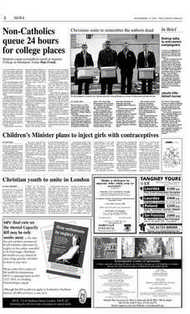Page 11, 19th November 2004
Page 11

Report an error
Noticed an error on this page?If you've noticed an error in this article please click here to report it.
Tags
Share
Related articles
A View Of Unity For Arcic Ii And The Wcc
Green In An Arcie Winter
Lambeth Address
All Power To Ecological Ecumenism Medjugorje And I V, Rite
Arc1c Can Take Up The Suggestion By Edward Echlin (july
ARCIC WINTER
Ecumenical movement enters a new era
As buzz words go, “ecumenism of life” is hardly the most memorable or euphonius. But it is a phrase that cannot be avoided if one wishes to evaluate the present state of the ecumenical movement. The term appeared frequently in Cardinal Cormac Murphy-O’Connor’s address at last weekend’s conference in Rome marking the 40th anniversary of Vatican II’s Decree on Ecumenism, Unitatis redintegratio.
So why has this new piece of jargon been added to the bulging ecumenical lexicon? In his speech, the Cardinal contrasted ecumenism of life with two other expressions of the search for Christian unity: “spiritual ecumenism” and the “ecumenism of truth”. Spiritual ecumenism refers, as one might expect, to interdenominational prayer and reflection, and ecumenism of truth to dialogue on doctrinal matters. Ecumenism of life includes every other contact between Christians of different traditions.
The phrase also indicates a new era in ecumenism. The heady atmosphere of the early ecumenical movement (when union was thought to be only a few doctrinal agreements away) has given way to a cautious realism. Nowadays not even the most optimistic bishop expects full visible unity within his lifetime. This new realism has been greeted with a sigh of relief by the laity, which has, broadly speaking, never been as enthusiastic about ecumenism as the Hierarchy.
The fate of Anglican-Catholic dialogue graphically illustrates the problems of an ecumenism focused too narrowly on doctrinal convergence. Over the past 40 years it is clear that, despite a string of landmark joint statements, the Anglican Communion and Catholic Church have diverged, rather than converged on key doctrinal matters. And after almost four decades of labour, it seems that there is no more work for the members of the Anglican-Roman Catholic International Commission (ARCIC) to do. After the long-awaited statement on Mary is released, is by no means clear what, if anything, the Commission will tackle next.
Nevertheless, it would be regrettable if Catholics were simply to say: “We told you so”, and dismiss ecumenism as hopelessly utopian. For the apparent failure of doctrinal dialogue means that, from now on, every individual Catholic is responsible for fostering unity between Christians. Ecumenism is no longer the preserve of theologians or cardinals. In the new era we are all personally responsible for the success or failure of the ecumenical movement.
blog comments powered by Disqus

















